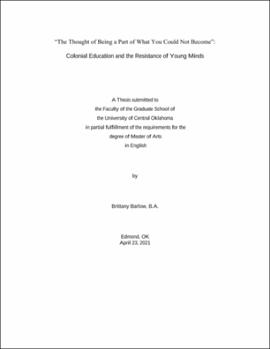| dc.contributor.advisor | Kiang, Shun Y. | |
| dc.contributor.author | Barlow, Brittany | |
| dc.date.accessioned | 2021-12-07T18:24:00Z | |
| dc.date.available | 2021-12-07T18:24:00Z | |
| dc.date.issued | 2021 | |
| dc.identifier.other | (AlmaMMSId)9982820094102196 | |
| dc.identifier.uri | https://hdl.handle.net/11244/331401 | |
| dc.description.abstract | This project engages with the colonizer’s use of the colonial education system to penetrate the colonized people’s pre-colonial cultural systems and the way it leads to the destruction of any already-formed understandings a person may have of oneself. The three chapters explore and explain the ways in which these literary representations are the colonized person’s articulation of their resistance to the colonial systems, showing that these representations are to be a way of taking back and reconfiguring one’s history and identity.
Paulo Freire’s Pedagogy of the Oppressed explains that our education system continues the colonial aim of reproducing proper subjects. He argues that educators must fight against this enforced system, encouraging students to think critically—“the solution is not to ‘integrate’ them into the structure of oppression, but to transform that structure so that they can become beings for themselves” (47). Chapter one of this project presents problem-posing techniques when reading Frankenstein to challenge and deconstruct previous Eurocentric readings of the text.
Chapter two critiques the colonial education system in Africa and its gendered and racial applications among young peoples, in both colonial and settler-colonial communities. The third chapter emphasizes the form of the education system, highlighting its mimetic nature in order to form “proper” subjects rather than subjects who are able to question the status quo.
Within this colonial education system, colonized people are informed of who they are, who their people are, and who they are in relation to the colonizer. Each of these chapters exhibits a different aspect of the colonial education system put into place during the period of British Imperialism and the ways in which the Other destabilizes this system. | en_US |
| dc.rights | All rights reserved by the author, who has granted UCO Chambers Library the non-exclusive right to share this material in its online repositories. Contact UCO Chambers Library's Digital Initiatives Working Group at diwg@uco.edu for the permission policy on the use, reproduction or distribution of this material. | |
| dc.subject.lcsh | Education | |
| dc.subject.lcsh | Great Britain | |
| dc.subject.lcsh | Colonies | |
| dc.subject.lcsh | Psychological aspects | |
| dc.subject.lcsh | Postcolonialism in literature | |
| dc.subject.lcsh | Other (Philosophy) in literature | |
| dc.subject.lcsh | Identity (Psychology) | |
| dc.subject.lcsh | Control (Psychology) | |
| dc.title | “The Thought of Being a Part of What You Could Not Become”: Colonial Education and the Resistance of Young Minds | en_US |
| dc.type | Academic theses | |
| dc.contributor.committeeMember | Macey, J. David | |
| dc.contributor.committeeMember | Quoss-Moore, Rebecca M. | |
| dc.thesis.degree | M.A., English Literature | |
| dc.subject.keywords | Colonial classroom | |
| dc.subject.keywords | Epistemic violence | |
| dc.subject.keywords | Identity | |
| dc.subject.keywords | Language | |
| dc.subject.keywords | Postcolonial literature | |
| dc.subject.keywords | Literature | |
| dc.subject.keywords | Education | |
| dc.subject.keywords | European studies | |
| dc.identifier.oclc | (OCoLC)1302199172 | |
| thesis.degree.grantor | Jackson College of Graduate Studies | |
